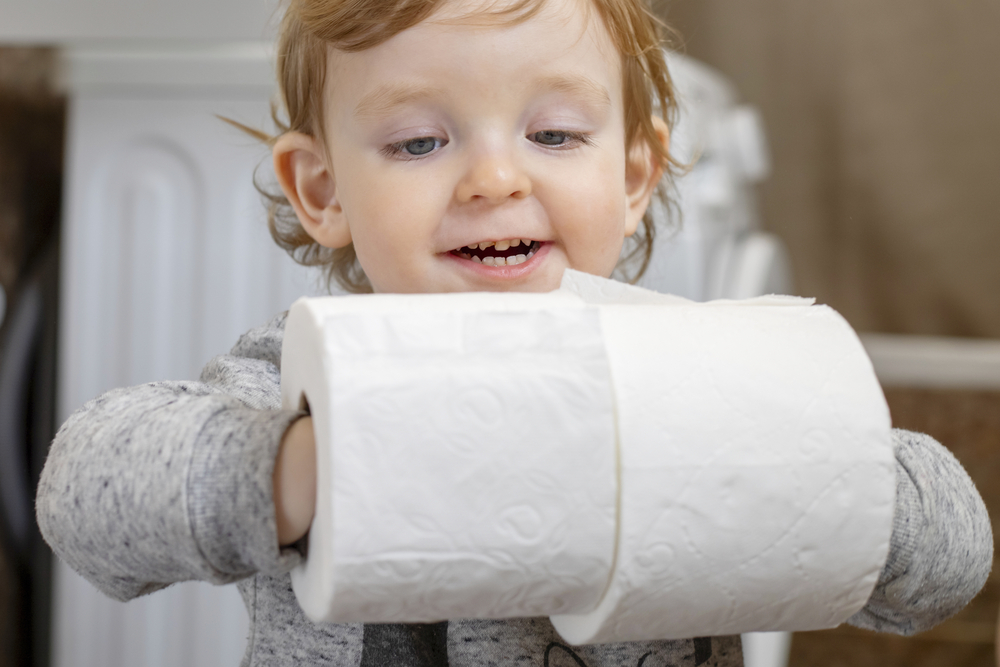Potty training your toddler can seem like a daunting task. If you have a friend with boys you may have heard horror stories about how it takes a long time and they have struggled to get their boys to potty train. It is important to know that when potty training boys it may take longer than with girls. Some boys start as early as 18 months, but some may not be ready until after 3 years old.
Most children are completely trained between 24-48 months of age. With boys most of the time they are ready around 27 months old. Boys may want to stay in diapers longer due to being more active and less likely to stop playing to go to the bathroom. Starting too soon may make the process longer in the end and just cause more headaches and struggles.
Signs Your Child Is Ready To Potty Train:
There are a few things you can look for to see if your child is ready to potty train. One thing to make sure your child can do is walk to the potty and either sit down on a small potty that you have, or climb on a stool to sit on a regular toilet.
Another sign your child may be ready to potty train is if they can pull their pants up and down on their own. Not all children will master this before they are potty trained, but some will.
If you notice your child’s diapers are staying dry for an extended amount of time, such as two hours or so.
If your child can follow basic instructions is another good sign.
Communication is usually the big one parents like to wait for. When your child can communicate they need to go potty, or they have started communicating to you that they have gone potty in their diaper they may be ready to move onto potty training.
If your child has shown an interest in potty training, or big kid underwear this also may be a good sign.
Methods Of Potty Training:
Once the signs are there you will want to settle on an approach.
What method you chose comes down to how much time and dedication you are willing to put in. Potty training is primarily the dedication of the parent to being consistent. It is important to make sure all caregivers of the child know what method you have decided on so that all potty training is kept consistent through the child’s care.
There is no right or wrong method. It may take more than one method to successfully potty train your child. If one method isn’t working, take a break, switch methods, and start again. Most method choosing comes down to the amount of time to devote, readiness of the child, and what method fits best with your everyday life.
It may be best to start when the child has a long extended period with the parents at home. This could be a long weekend, or a time a parent has off to be home with the child. Starting on a random day of the week when the child will be at daycare the next day, may not be the best choice.
For A Brief Time The “POTTY” Will Consume Your Life
Once you have decided on potty training, make it part of your daily routine. Talk all things potty. Talk about you having to go to the potty with your child. Talk about going on the potty when you are changing their diapers. Read books about going on the potty. If they have older siblings you can talk about how they go on the potty if they are already potty trained. Have a potty schedule. This could be you sitting on the potty when they first wake up, before or after a meal, and before bedtime. Don’t make them sit too long though, if nothing happens let them get up and go about their day. They shouldn’t feel like sitting on the potty is punishment if they don’t go.
Summertime May Be The Right Time
Summertime potty training may be a good option. This way you can have them in a few clothes, or even naked. Less clothing means there is less to have to deal with when a potty emergency comes up.
Pay attention to your child, they may start giving you signs of when they may need to go. Crossing their legs, not being able to sit still, or if they are about to have a bowel movement maybe they go away to be alone, or stand extremely still.
READ MORE: Parenting And The Terrible Twos
Don’t Let Outings Throw You
When you first start potty training, outings may feel overwhelming. Don’t let them. Pack extra clothes in case of an accident. Stress the need to potty at home before you leave for the outing. If there is a bathroom where you are going, you can try and go before you leave as well.
Accidents may happen, try to stay calm and collected so your child doesn’t think they are in trouble. When you have somewhere to go it may be easy to put your child in diapers so you don’t have to worry about accidents. However, this could actually set your child back and make the whole process start over again.
Get them involved in picking out fun big boy underwear.
Sitting & Standing
Once your little boy has mastered sitting down, this is when you start trying to master standing up and peeing. At first it is nice for your child to just sit when they go because they don’t have to distinguish between what bathroom business they need to do. When working on standing, you can have their dad help demonstrate how it is done, so they can imitate what they see.
If there are no men caregivers then it may be a little trickier since they won’t have seen anyone do this. Have your child stand close to the toilet, the closer they are the easier it is to aim. Have them hold their penis to aim the stream into the toilet. Mastering standing up is all about practice. Have your child help clean up any splashes with a wipe, and practice good hand hygiene.
Night Time
Night time potty training is a whole other field of battle. Don’t be worried about keeping your child in pull ups or diapers just at night. Learning to not have accidents at night can sometimes take children up to age 5.
Things you can do to help with potty training at night are limit water and beverages before bed. Make sure they use the potty before they go to sleep. Add a mattress protector to make sure your bed is waterproof.
Aim For Progress Not Perfection
Prepare for setbacks. Accidents are likely to happen. Make sure you keep calm and collected through them and try not to scold.
Remind your child they just have to tell you when they need to go potty and you will get them to one.
Keep extra clothes in the car, or your purse for a while after you have potty trained.
Don’t stop going out and doing things while potty training. Your child will need to learn how to get to a bathroom in all different places in their life.
When To Ask For Help
If you are consistent with potty training and there is no progress after 6 months you may want to reach out to your child’s pediatrician.
If your child is consistently having accidents after age 5 you will need to talk with their doctor, they may want to take a urine sample to make sure your child doesn’t have a condition that is causing them to have these accidents.
Takeaway
Potty training boys can sometimes happen in a blink of an eye super quickly. It can sometimes take much longer than expected.
If you start potty training and your child isn’t willing or wanting it may mean you have started too early and you just need to come back and try again another time. Don’t force your child to potty train, it may make the process longer.
Potty training is the dedication and persistence of the parent so find what works best for you and your family.
Potty training? Boys are generally able to start potty training around 27 months! Learn some tips and tricks. #HealthSurgeon
Sources:
https://www.babycenter.com/toddler/potty-training/tips-for-potty-training-boys_11652
https://www.babycenter.com/toddler/potty-training/potty-training-boys_4684
https://www.healthline.com/health/parenting/potty-training/how-to-potty-train-a-boy#takeaway
https://justsimplymom.com/potty-training-tips-for-boys/
Worried about your toddler’s nutrition?
The DELICIOUS taste of CREAMY CHOCOLATE and the power of over 20 organic superfoods.
Purium’s Epi-Genius Kids









